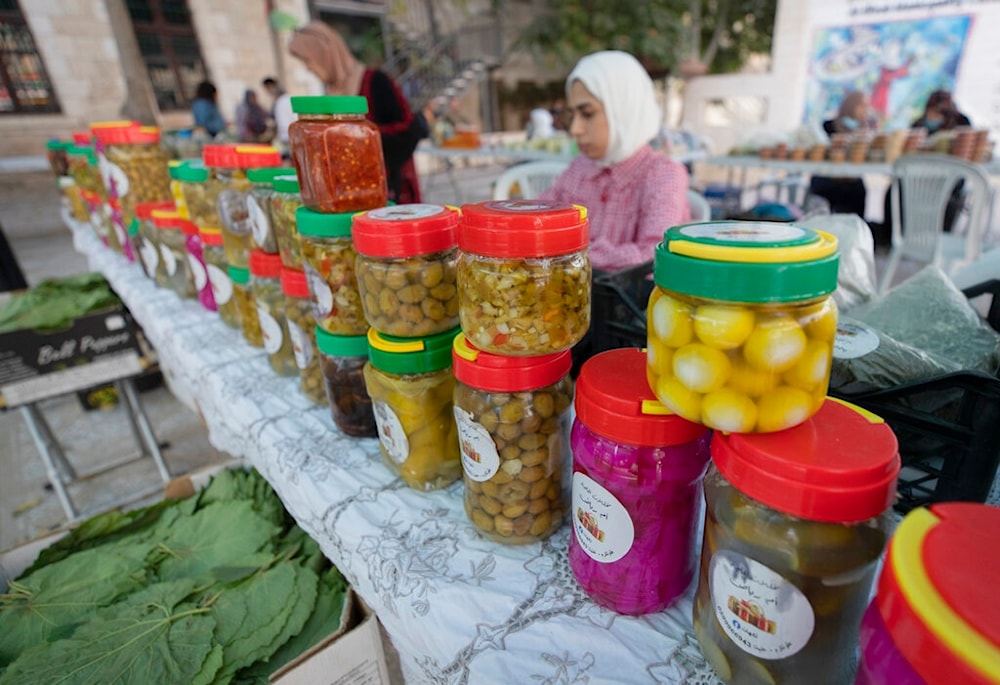'Israel' economically choking West Bank in subjugation attempt
The Israeli occupation's control over Palestinian economic resources, exacerbated by recent Israeli military failure in the Gaza Strip, has intensified, leading to dire financial conditions for the Palestinian Authority and population, with implications on political dynamics.
-

A Palestinian woman displays her products of pickles for sale at the Soq al-Fallahat, which means "women farmer bazar," in the West Bank city of Ramallah, Saturday, October 24, 2020. (AP)
"Without these funds [import duties and value-added tax], the Palestinian Authority struggles to pay the salaries of its civil servants and its running costs," said Taher al-Labadi, a researcher at the French Institute for the Near East, as he explained that "Israel" has been holding the Palestinian people in an economic chokehold.
Palestinian economist Adel Samara told AFP that the genocidal war against the Gaza Strip following Operation Al-Aqsa Flood has not only devastated the Gaza Strip but also resulted in "Israel" tightening the noose against the Palestinian Authority, which rules parts of the West Bank.
This was possible because the Palestinian economy operates under the 1994 Paris Protocol, which was meant to last for five years until the establishment of the Palestinian State. It is through this protocol that "Israel" holds control over the territories' borders, allowing it to collect import duties and value-added tax for the Palestinian Authority. "Israel" has frequently used this authority to withhold vital revenue from the PA. However, since "Israel's" deterrence was scathed, Tel Aviv's control intensified, tightening its hold even further said Samara.
Samara said that "technically speaking, there is no Palestinian economy under Israeli occupation -- our economy has been effectively annexed by Israel's," referring to the sectors of tourism, labour, and trade altogether.
Collective punishment
In turn, Israeli occupation political analyst Michael Milshtein told AFP that Israeli occupation statistics show that approximately one-third of the income in the West Bank was derived from the earnings of 193,000 Palestinians employed in "Israel". However, the current number of Palestinians working in "Israel" has significantly decreased to between 8,000 and 9,000.
Milshtein stressed, "It's a way to collectively punish Palestinians...whom they also see as enemies."
However, Nasr Abdel Kareem, an economics professor at the Arab American University in the West Bank, had made a different but similar argument. Abdel Kareem explained that Israeli PM Netanyahu has been playing a game of chess.
"Netanyahu is putting pressure on the Palestinians and signaling to the authority that the levers of the Palestinian economy are in (Israel's) hands," Abdel Kareem said before adding that "Netanyahu believes that he will weaken the authority and make it accept political concessions" when, according to him, a peace agreement would be eventually written.
Abdel Kareem, however, underscored that this is an unrealistic and flawed strategy as it assumes that fostering economic growth in the Palestinian territories would inherently lead to peace in the West Bank.
"Historically, previous uprisings broke out" when the West Bank and occupied Palestinian territories were in a much better economic state.
"Palestinians want to live with dignity, but for them this also implies liberation and the establishment of a Palestinian state," said the economist.
IOF withdraw from Tulkarm amid heavy confrontations against Resistance
Al Mayadeen's correspondent in occupied Palestine reported early on Sunday that Israeli occupation forces partially withdrew their soldiers from the Nur Shams camp in Tulkarm, in the occupied West Bank, following a three-day siege.
Reportedly, the IOF shut the Hamra checkpoint in the town of al-Aghwar after Resistance fighters carried out several shooting operations against their soldiers.
Our correspondent also relayed that an Israeli military jeep was targeted and fired at in Ramallah, in the West Bank.
This coincides with the announcement of the withdrawal of Israeli troops from Nur Shams after a three-day siege during which several Palestinians were martyred, while others were detained by the IOF.
The Israeli occupation consequently revealed that seven soldiers were wounded throughout their offensive, two of whom had sustained moderate injuries.
Earlier, the Palestinian Red Crescent stated that the death toll in the Nur Shams camp had risen to 14 martyrs in an incomplete tally.
Read more: Existential war: Gaza to West Bank & Iran's retaliation

 4 Min Read
4 Min Read








